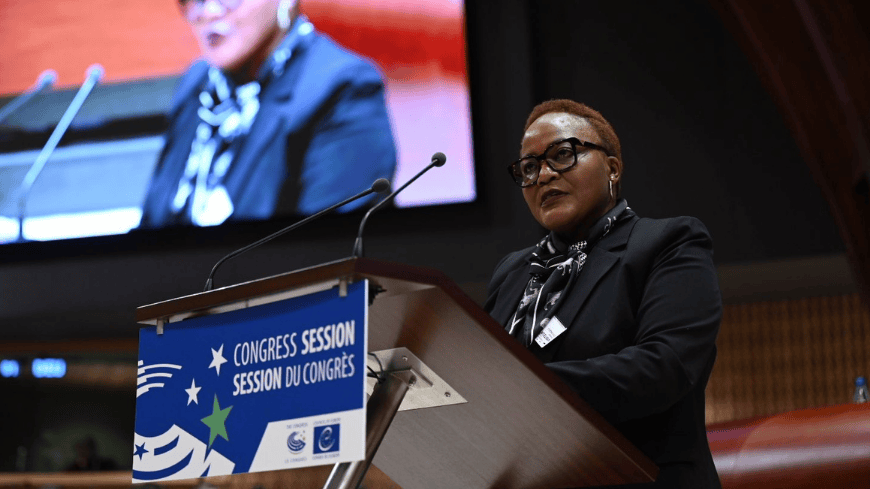No matter where they are, cities on every continent and in every country are all facing common challenges, including in their dealings with central government. A debate on “local and regional democracy around the world” on Tuesday 25 March reminded us that the principles of local self-government, as defined by the European Charter of Local Self-Government, extend far beyond the borders of Europe.
Elected mayor of Lusaka, the capital of Zambia, in southern Africa, in 2021, Chilando Chitangala, like her European colleagues, is aware that the future of her city hinges on effective municipal policies and services. Even if some sectors are starting to decentralise, relations between central government and the city remain complicated, especially when the two tiers are required to share powers and responsibilities in the same area, as happens, for example, with road infrastructure or water and environmental policies. Regrettably, she explained, there are often conflicts in the management of public services, and even though central government finances only 20% of the expenditure in some sectors, its interference remains widespread. The fact, too, that Ms Chitangala is from a party that is in opposition to Zambia’s ruling party further complicates relations between the capital and central government. “These are problems with which you are very familiar, and I believe that your experience, particularly through the European Charter of Local Self-Government, could be very useful to us in moving towards greater local democracy,” she continued. Mention was also made of her city’s initiatives to develop citizen participation and consultation, in an effort to involve residents more in local policy making.
“The values of local democracy are the same everywhere!”
The Mayor of Turbat, in Balochistan (Pakistan), Balakhsher Baloch believes that “local democracy is the backbone of effective governance”, especially as it is “at the local level that solutions to global challenges are born,” he said, addressing the Congress. He was concerned to note, however, that there were still numerous structural, administrative and financial barriers to the development of local democracy, even though his own city stood out in this area: “We are one of the most dynamic cities in the country, and we are also counting on our young people, who are well represented in our assemblies, to secure our future”. “Whether we are in Paris, Lusaka or Turbat, we all have the same democratic aspirations, and the values of local democracy are the same everywhere,” he concluded, adding that Turbat was seeking partnerships with European cities and universities, not only to offer internships to students, but also to strengthen local governance based on the European model.
While many countries around the world are turning to local democracy, others are drastically impeding its growth: Iryna Khalopitsa, member of the Co-ordination Council of the Democratic Forces of Belarus, who had been invited to a Congress session for the first time, said that President Lukashenko had completely immobilised local authorities, in favour of an extreme centralism from which the country, before he came to power, had been starting to move away. “We are eager to work with the Congress and share experiences, so that Belarus can one day sign the Charter of Local Self-Government,” she said, welcoming the symbolic nature of her participation in the debate.
After the presentations, several Congress youth delegates spoke about the importance of involving young people more in local political life, pointing out that “young people don’t vote if they think nothing changes in town halls”: mayors must also understand that they have to step back to make room for the younger generations, said Renas Karlinskis (Latvia). The mayors of Lusaka and Turbat responded, pointing to the youth councils operating in their own cities, and their commitments in this regard.
The European Charter of Local Self-Government is not just about Europe
Lastly, Xavier Cadoret (France, L, SOC/G/DP) proposed that a study be conducted to assess the potential of the Charter to encourage and develop local democracy around the world. “We share the same problems, particularly where relations with central government are concerned, and maybe the solutions we have found can be replicated elsewhere?” he wondered. Congress President, Marc Cools, wanted the Charter to be able to be ratified “by more than just European cities”, and hoped to achieve this objective as soon as the Committee of Ministers had approved such a move.
Mediabox interview with Chilando Chitangala and Balaksher Baloch
Local and regional democracy around the world
***




